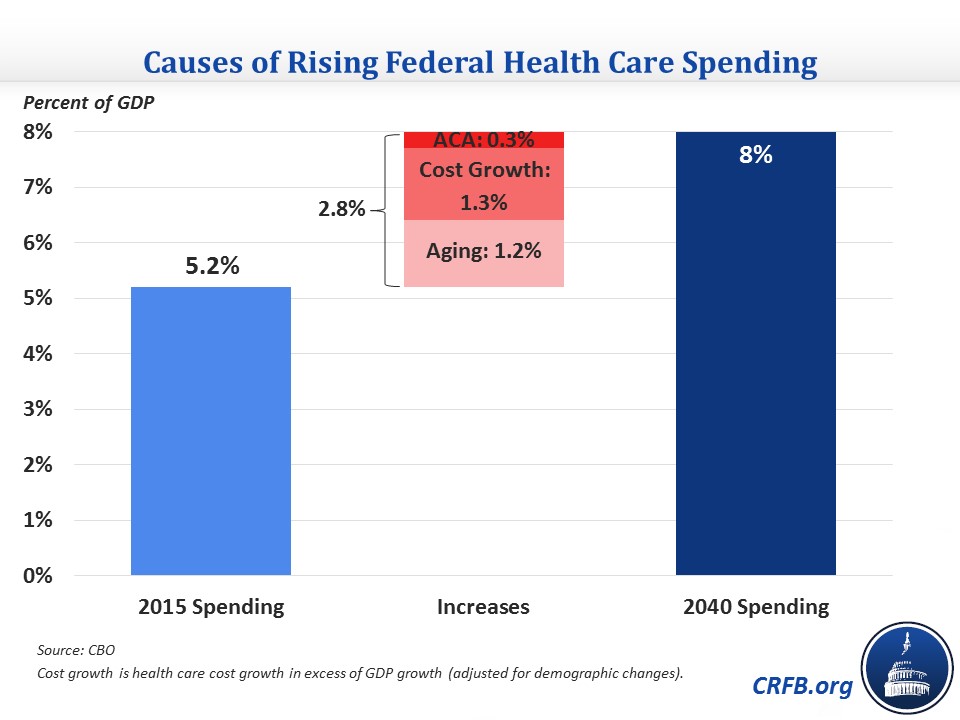Health Reform Issues That 2016 Candidates Should Consider
The Brookings Institution’s Center on Children and Families recently held an event to discuss issues for the 2016 presidential candidates to emphasize during their campaigns. Eight papers were presented on topics that will be of significance during this coming election cycle, including one on the federal debt by CRFB president Maya MacGuineas and Concord Coalition executive director Bob Bixby.
Alice Rivlin and Robert Reischauer, board members for the Committee for a Responsible Federal Budget, also wrote about important health care topics in their piece Health Policy Issues and the 2016 Presidential Election, which offers three recommendations for candidates during the campaign season. The paper advises candidates to put forward specific ideas to address the impending insolvency of the Medicare Trust Fund, address healthcare costs that are projected to accelerate in the coming years, and offer firm, cost-effective proposals to improve or replace (depending on the party) the Affordable Care Act.
Rivlin and Reischauer explain that the Medicare Part A trust fund for hospital insurance is projected to be depleted by 2030, after which Medicare will only have enough revenue to cover 86 percent of its Part A cost. In addition, Medicare spending in Parts B and D is projected to increase from 2.04 percent to 3.38 percent of GDP over the next twenty years. They note that if the ACA is repealed outright without a replacement, the trust fund will be depleted even more rapidly because the ACA’s payment controls and increased Medicare tax on high earners would be eliminated. The authors recognize that policies addressing trust fund depletion and rising costs throughout Medicare can be politically controversial, but nonetheless urge the 2016 candidates to offer clear proposals on this issue. Current policy ideas include moving Medicare to a premium support system, raising the retirement age, utilizing new payment methods, limiting expensive pharmaceuticals, raising payroll taxes, and increasing premiums, deductibles and cost sharing.
The authors also discussed the rising cost of health care across the private and public sectors. Currently, the United States spends 18 percent of GDP on healthcare, with projections suggesting this will soon rise to more than 20 percent. Spending growth is expected to accelerate in the future on a per-capita basis, and will grow even more when looking at total spending as the baby boomers retire, which will expand Medicare enrollment by 3 percent per year and result in a more expensive population. Rivlin and Reischauer recommend that candidates clearly articulate their views on the challenges of increasing healthcare costs and how they will address them.
Finally, this paper identifies the need for clear and firm proposals for improving or replacing the ACA. Republicans and Democrats are most divided on the ACA, and the authors argue that both parties have room to improve their positions. For their part, Democrats should collaborate with Republicans to reform or replace certain parts of the ACA that may be unlikely to take effect in their current form (such as the Independent Payment Advisory Board or the Cadillac tax) while also ensuring that healthcare remains affordable for low-income and elderly families. The authors then urge Republicans to offer very specific proposals for replacing the ACA since only pursuing repeal will create uncertainty for insurers, providers, and patients. Of particular importance is for Republicans to identify how they will replace the ACA's cost-saving measures, which include the Cadillac tax, medical loss ratio limits, premium rate reviews, and payment cuts to institutional providers and Medicare Advantage plans.
Health care spending is a key driver of our nation’s debt over the long-term, with the federal portion of spending projected to grow from 5.2 percent of GDP in 2015 to 8 percent by 2040. Rivlin and Reischauer are right to encourage candidates to present their recommendations to address this growing fiscal concern. We hope to soon hear more concrete plans from the candidates on this important issue.
Read the full paper here and compare the Republican Presidential candidates' proposals on Medicare and Medicaid here.


